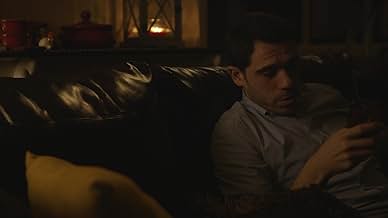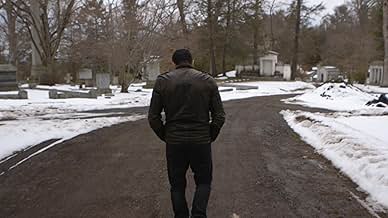अपनी भाषा में प्लॉट जोड़ेंA sensational, sentimental, and philosophical horror neo-noir that follows the still-at-large crimes of Noel, a repentant, classy and charming serial killer loose in the suburbs of New York.A sensational, sentimental, and philosophical horror neo-noir that follows the still-at-large crimes of Noel, a repentant, classy and charming serial killer loose in the suburbs of New York.A sensational, sentimental, and philosophical horror neo-noir that follows the still-at-large crimes of Noel, a repentant, classy and charming serial killer loose in the suburbs of New York.
Margeaux Dupuy
- Popcorn Server
- (as Margeaux Caroline)
Logan C. Kenney
- Tanner Boy
- (as Logan Kenney)
फ़ीचर्ड समीक्षाएं
Once the opening sequence began, I was hooked. Slowly and surely, as the film progresses, the story gathers its concept that is unique and highly refreshing.
The found-footage/mockumentary concept can either pull you right in or push you out. It's not an easy approach but it is cleverly done in order for the audience to go along the journey finding out the twists, shocks, and momentary reliefs (before it comes back to shock you again).
Noel's journey as a highly intelligent and articulated serial killer, one have to ask themselves, is this person insane for the sake of it or just plain insane. The film unravels these questions carefully to learn his motives. Additionally, Errol and Ellis' filmmaking motives is just as dangerous as Noel. Willing to learn and discover the hidden secrets as they collect Noel's footage. The attempts of doing so can result with serious consequences.
Colin Bemis' creative take with a ultra low budget with a small crew is surprisingly feasible with great effort. The choices of camera footage from Skype videos to GoPro cameras add a particular modern touch. It was not supposed to look at its finest high quality but rather a conceptual one. Aiden Bristow carried a tremendous weight to make the role exceptional and uncomfortably charming. The duo, Nicholas Urda and Andres Montego, equally gave a interesting take of filmmakers who dared to collaborate with a serial killer unknowing the results.
All in all, with certain philosophical discussions between the characters, the shock values of the crime scenes, & the twists and turns of the serial killer's attempt; it felt like a strange ride.
The found-footage/mockumentary concept can either pull you right in or push you out. It's not an easy approach but it is cleverly done in order for the audience to go along the journey finding out the twists, shocks, and momentary reliefs (before it comes back to shock you again).
Noel's journey as a highly intelligent and articulated serial killer, one have to ask themselves, is this person insane for the sake of it or just plain insane. The film unravels these questions carefully to learn his motives. Additionally, Errol and Ellis' filmmaking motives is just as dangerous as Noel. Willing to learn and discover the hidden secrets as they collect Noel's footage. The attempts of doing so can result with serious consequences.
Colin Bemis' creative take with a ultra low budget with a small crew is surprisingly feasible with great effort. The choices of camera footage from Skype videos to GoPro cameras add a particular modern touch. It was not supposed to look at its finest high quality but rather a conceptual one. Aiden Bristow carried a tremendous weight to make the role exceptional and uncomfortably charming. The duo, Nicholas Urda and Andres Montego, equally gave a interesting take of filmmakers who dared to collaborate with a serial killer unknowing the results.
All in all, with certain philosophical discussions between the characters, the shock values of the crime scenes, & the twists and turns of the serial killer's attempt; it felt like a strange ride.
What can I say about Strawberry Flavored Plastic? It's a solid mockumentary about an at-large serial killer named Noel Rose (played wonderfully by Aidan Bristow), who's next in line along with Patrick Bateman (American Psycho), Henry (Henry: Portrait of a Serial Killer), and Hannibal Lecter (Silence of the Lambs). This particular psychopath is an emotional type with a special motive. And what is that special motive? Well, you have to see this film to find out as the filmmakers Errol Morgan (Nicholas Urda) and Ellis Archer (Andres Montejo) are partaking to film a risky documentary on Noel's life. The shots in this film are wonderful, plus the suspense is top notch. Defiantly recommend it!
1w00f
I forced myself to sit through an hour of this before giving up. 90% of what I saw was people sitting around talking in stilted sentences that sounded like someone wrote them. People don't talk this way.
It drags and it lags. There's an aura of hubris around this film, the kind one might expect from a naïve beginning director. Despite claims, there's nothing sensational about this snoozer.
It drags and it lags. There's an aura of hubris around this film, the kind one might expect from a naïve beginning director. Despite claims, there's nothing sensational about this snoozer.
The concept "serial killer needs to express himself to the camera" has by now been explored quite well in multiple mockumentary/found footage movies, such as MAN BITES DOG (1992), THE LAST HORROR MOVIE (2003), THE MAGICIAN (2005), RANDOM ACTS OF VIOLENCE (2012), CREEP (2014) and CREEP 2 (2017).
Joining this oeuvre of generally high-quality movies is now STRAWBERRY FLAVORED PLASTIC, the title of which refers to people who have a certain quality of sweetness that is entirely fake, an inauthentic pleasantness that characterizes the banal existence of those who fail to express who they really are because they know that society would not approve.
The protagonist, an intelligent serial killer, uses his opposition to this type and his own falling into it as philosophical cover to justify indulging what he calls the "unscratchable itch", evidently an overwhelming desire at random moments to hurt random people. However, he still professes that he wants to change. He allows two film-makers to document his life, and it is through this footage of him giving interviews and being filmed that we get a glimpse of who he is.
And it is never more than a glimpse, because as soon as we think that we have some understanding of him as a person, he surprises us with something completely unexpected. One of the documentarians makes this point explicitly in the movie.
The actor playing the serial killer does an outstanding job, and when he adopts the "nice" persona, it seems so genuine that his sudden transformations into the "evil" persona becomes that much more shocking and disturbing.
Compared to the aforementioned list of movies, this film puts the least emphasis on actual killings, though there are some. There is also a fantastically creepy scene in which he ambushes the two film-makers after they break an agreement he made with them. But overall, this is a very contemplative, philosophically-minded movie which not only explores the mind of a serial killer but also the ethical quandaries that those put themselves into who wish to document it.
The characters talk in a curiously stilted way which reminds me a little of how in THE COUNSELOR (2013), itself interpretable broadly as an exploration of different levels of sociopathy, the characters talked like they were reciting book passages, no doubt because Cormac McCarthy himself wrote the screenplay. I think in PLASTIC, it was effective for the serial killer to talk this way, but less so for the documentarians.
I believe the dialogue and musings in this film will cause many to accuse it of pretentiousness, a charge I was willing to deny until I saw the ending, more below.
The movie has a somewhat slow pace, and certainly those expecting action and suspense will be largely disappointed, as will be those who are not into cerebral movies. The ending is rather baffling. I will share below my thoughts on it, but be warned, spoilers ahead.
Toward the end, the serial killer informs the documentarians that they will stop communicating because he intends to do something "catastrophically large". After that, we hear an audio recording of the wife of one of the documentarians reporting him to the police, which is followed by footage of him getting into a car with his little daughter, a notice that there have been 4 unresolved killings in Maine, and another audio recording between a police detective and one of the film-makers, who says he won't be released (presumably from prison) until his own little son is 17. He states, very much in the speaking manner of the serial killer, that his project will never be finished. Finally, we see a sequence in which the serial killer breaks into that documentarian's home and kills his wife before observing himself in the mirror.
So, what seems fairly clear is that the serial killer moved with his Daughter from New York to Maine, and carried on his killings there, despite the fact that he had earlier professed a desire to stop. His "catastrophically large" project was nothing more than a ruse to distract the film-makers.
The unclear part is why the film-maker was convicted, presumably for the murder of his wife, why he seems to have accepted responsibility for it, and why he begins to speak exactly like the serial killer.
This would have made sense to me if the final mirror image reflection showed the documentarian. In fact, that would have beautifully tied the overall theme of the movie together: he discovered through the process of making his documentary that he was "Strawberry Flavored Plastic", decided to break from this type and become authentic. But that entailed killing his wife who, the movie makes quite clear, stood in the way of him realizing his dreams. He did it unapologetically, thereby following into the serial killer's footsteps, going even so far as adopting his way of speaking. The great irony here then would be that he "achieved authenticity" by adopting someone else's persona.
Alas, the man in the mirror in the final scene is the serial killer, not the husband, and so this theory goes out the window.
Because it seems so oddly specific in how it undermines a rational explanation for the husband's behavior at the end, the final scene makes me suspect that it was designed to create perplexity for the sake of perplexity. It smacks of pretentiousness, and so I must concede that, perhaps, those who have made this charge against the movie were right, after all.
Joining this oeuvre of generally high-quality movies is now STRAWBERRY FLAVORED PLASTIC, the title of which refers to people who have a certain quality of sweetness that is entirely fake, an inauthentic pleasantness that characterizes the banal existence of those who fail to express who they really are because they know that society would not approve.
The protagonist, an intelligent serial killer, uses his opposition to this type and his own falling into it as philosophical cover to justify indulging what he calls the "unscratchable itch", evidently an overwhelming desire at random moments to hurt random people. However, he still professes that he wants to change. He allows two film-makers to document his life, and it is through this footage of him giving interviews and being filmed that we get a glimpse of who he is.
And it is never more than a glimpse, because as soon as we think that we have some understanding of him as a person, he surprises us with something completely unexpected. One of the documentarians makes this point explicitly in the movie.
The actor playing the serial killer does an outstanding job, and when he adopts the "nice" persona, it seems so genuine that his sudden transformations into the "evil" persona becomes that much more shocking and disturbing.
Compared to the aforementioned list of movies, this film puts the least emphasis on actual killings, though there are some. There is also a fantastically creepy scene in which he ambushes the two film-makers after they break an agreement he made with them. But overall, this is a very contemplative, philosophically-minded movie which not only explores the mind of a serial killer but also the ethical quandaries that those put themselves into who wish to document it.
The characters talk in a curiously stilted way which reminds me a little of how in THE COUNSELOR (2013), itself interpretable broadly as an exploration of different levels of sociopathy, the characters talked like they were reciting book passages, no doubt because Cormac McCarthy himself wrote the screenplay. I think in PLASTIC, it was effective for the serial killer to talk this way, but less so for the documentarians.
I believe the dialogue and musings in this film will cause many to accuse it of pretentiousness, a charge I was willing to deny until I saw the ending, more below.
The movie has a somewhat slow pace, and certainly those expecting action and suspense will be largely disappointed, as will be those who are not into cerebral movies. The ending is rather baffling. I will share below my thoughts on it, but be warned, spoilers ahead.
Toward the end, the serial killer informs the documentarians that they will stop communicating because he intends to do something "catastrophically large". After that, we hear an audio recording of the wife of one of the documentarians reporting him to the police, which is followed by footage of him getting into a car with his little daughter, a notice that there have been 4 unresolved killings in Maine, and another audio recording between a police detective and one of the film-makers, who says he won't be released (presumably from prison) until his own little son is 17. He states, very much in the speaking manner of the serial killer, that his project will never be finished. Finally, we see a sequence in which the serial killer breaks into that documentarian's home and kills his wife before observing himself in the mirror.
So, what seems fairly clear is that the serial killer moved with his Daughter from New York to Maine, and carried on his killings there, despite the fact that he had earlier professed a desire to stop. His "catastrophically large" project was nothing more than a ruse to distract the film-makers.
The unclear part is why the film-maker was convicted, presumably for the murder of his wife, why he seems to have accepted responsibility for it, and why he begins to speak exactly like the serial killer.
This would have made sense to me if the final mirror image reflection showed the documentarian. In fact, that would have beautifully tied the overall theme of the movie together: he discovered through the process of making his documentary that he was "Strawberry Flavored Plastic", decided to break from this type and become authentic. But that entailed killing his wife who, the movie makes quite clear, stood in the way of him realizing his dreams. He did it unapologetically, thereby following into the serial killer's footsteps, going even so far as adopting his way of speaking. The great irony here then would be that he "achieved authenticity" by adopting someone else's persona.
Alas, the man in the mirror in the final scene is the serial killer, not the husband, and so this theory goes out the window.
Because it seems so oddly specific in how it undermines a rational explanation for the husband's behavior at the end, the final scene makes me suspect that it was designed to create perplexity for the sake of perplexity. It smacks of pretentiousness, and so I must concede that, perhaps, those who have made this charge against the movie were right, after all.
Two filmmakers try to make a documentary about a suburban serial killer and the movie just copies the formula of the infamous serial killer classic MAN BITES DOG (Belgium-1992), but in a very blatant and boring way. Few killings, a lot of unnecessary talking and the film's 107 minutes are just a waste of time and money. Try to find the Belgian film instead...
टॉप पसंद
रेटिंग देने के लिए साइन-इन करें और वैयक्तिकृत सुझावों के लिए वॉचलिस्ट करें
विवरण
- चलने की अवधि1 घंटा 47 मिनट
- रंग
- पक्ष अनुपात
- 1.85 : 1
इस पेज में योगदान दें
किसी बदलाव का सुझाव दें या अनुपलब्ध कॉन्टेंट जोड़ें

टॉप गैप
By what name was Strawberry Flavored Plastic (2019) officially released in Canada in English?
जवाब





















